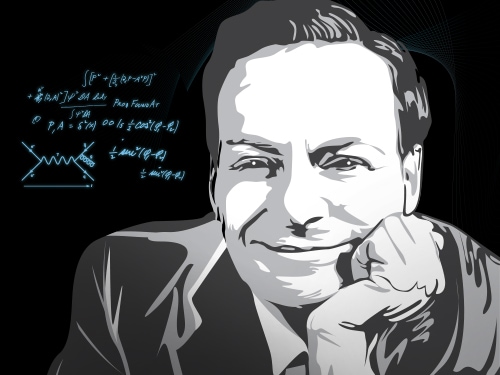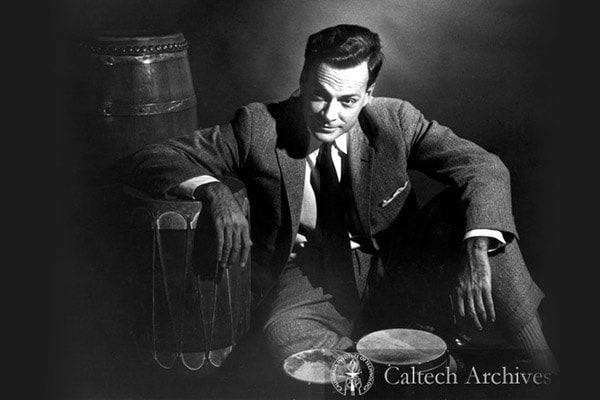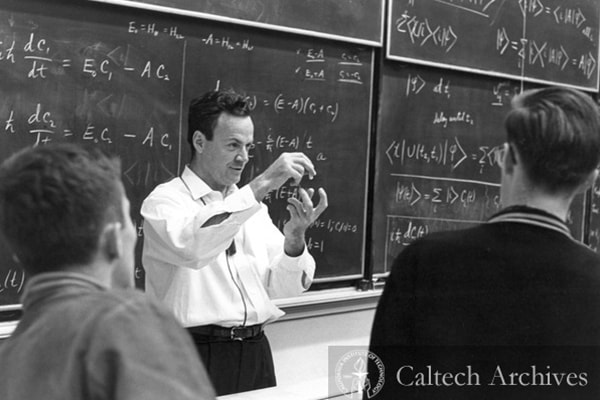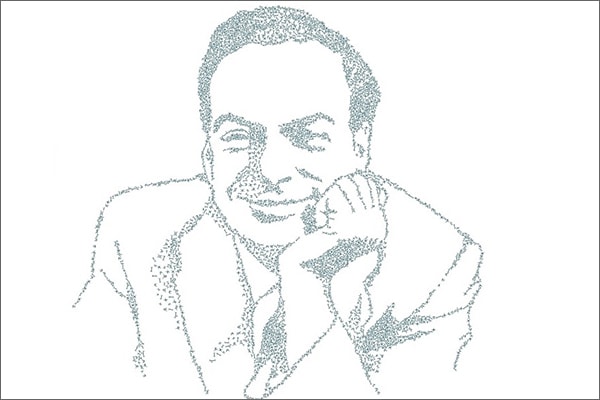The brilliant and multi-faceted life of Nobel Prize winning physicist Richard Feynman is being showcased in a brand new exhibition, curated and produced by ArtScience Museum, in collaboration with Nanyang Technological University, Singapore (NTU Singapore) and the Nobel Museum in Sweden, with support from the Centre for Quantum Technologies (CQT) at the National University of Singapore.
All Possible Paths marks the centenary of one of the most influential physicists of the 20th century, Richard Feynman. Feynman was an American theoretical physicist known for his work in quantum mechanics — the basis of modern physics and of many technological advances that now feature in our everyday lives. Feynman received the Nobel Prize in 1965, and his work changed the way physicists think forever.
All Possible Paths uses both art and science, as well as striking contemporary design, to convey the importance and relevance of Feynman’s work for today’s audiences. The exhibition shows how Feynman's curious nature and unconventional thinking drove him to explore many paths in life, including art and music. It includes personal letters, papers, photographs, Feynman’s famous bongo drums and his own paintings, which are being exhibited outside of the United States for the first time.
At the centre of the exhibitions are installations, sculptures and immersive environments created by contemporary artists such as Jun Ong, Frederick De Wilde, Eiji Sumi, ::vtol::, Edward Tufte and others, which take visitors deeper into Feynman's science through art.
Presented in four thematic sections, the show transports visitors into the world of one of the most important scientists of modern times, and shows how his discoveries have revolutionised our understanding of nature.
All Possible Paths is part of the Feynman Centenary, which is being celebrated around the world this year, with conferences and festivities, including a major scientific conference at NTU called, Richard Feynman at 100 (22-24 October).

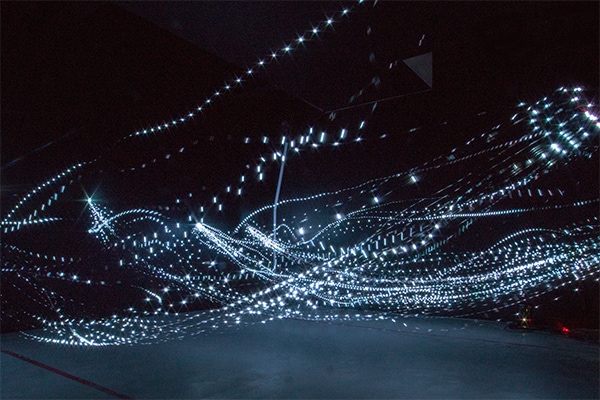


.jpg)
Feynman diagram pin ball machine
Party with some particle physics with this pinball machine!
.jpg)
Particle Physics Brick By Brick
Compete with your friends at constructing the building blocks of our universe at this hands-on lego challenge!
.jpg)
Feynman’s Last Blackboard
Discovered something exciting or have something exciting you want discover? Write on our black board to tell us!
Public Guided Tours
English Public Guided Tours
Family Friday 1, 8, 15 & 22 February, 1 March | 3.00pm - 3.45pm
Saturday 2, 9, 16 & 23 February, 2 March | 5.00pm - 5.45pm
Sunday 3, 10, 17 & 24 February | 5.00pm - 5.45pm
Sunday 3 March | 11.30am - 12.15pm & 5.00pm - 5.45pm
Mandarin Public Guided Tours
Saturday 16 & 23 February, 2 March | 2.30pm - 3.15pm
Sunday 17 & 24 February, 3 March | 2.30pm - 3.15pm
Venue: Exhibition Entrance, Basement 2
Join our guided tour to peer into the mind of Richard Feynman and discover how his thinking has provided the starting point for some of the most exciting ideas in science today.
*Complimentary to ticket-holders of Feynman. Up to 25 participants on a first-come, first-served basis
‘Feyn’ out about Nano!
Family Friday 1, 8, 15 & 22 February, 1 March | 4.30pm - 5.30pm
Venue: Rainbow Room, Basement 2
Explore the wonders of the nano world in this hands-on workshop. Work with your friends to find the micro-letters in our daily lives and have a go at ‘decoding the quote’ from your friend!
*$5 per participant. Up to 20 participants on a first-come, first-served basis.
Click here to book our workshops.
QUANTUM SHORTS
22 Feb, 24 – 26 Feb, 2 – 3 Mar 2019
10am - 7pm (on loop)
Expression Gallery, Level 4
Free admission
Quantum Shorts returns with short films inspired by or related to the theme of quantum physics. The film festival features narrative or abstract films by amateur and professional filmmakers motivated to tell their own stories about quantum physics.
ArtScience Museum proudly presents the 7th edition of Quantum Shorts, organized by Centre for Quantum Technologies at the National University of Singapore. The Quantum Shorts contest began in 2012 and has alternated between annual calls for science fiction and science films.
Please click here to find out more about the 10 shortlisted films and vote for your favourite film to win the People's Choice prize here
Please refer to our Facebook event page for more details.
All Possible Paths is a collaboration between ArtScience Museum, Nanyang Technological University and Nobel Centre, with key contributions and loans from the Centre for Quantum Technologies, California Institute of Technology and Michelle Feynman.
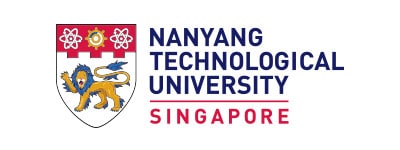
A research-intensive public university, Nanyang Technological University, Singapore (NTU) has around 33,000 undergraduate and postgraduate students in colleges of Engineering, Business, Science, Humanities, Arts, & Social Sciences and its Interdisciplinary Graduate School. It also has a medical school, the Lee Kong Chian School of Medicine, set up jointly with Imperial College London.
NTU is also home to world-class autonomous institutes – the National Institute of Education, S Rajaratnam School of International Studies, Earth Observatory of Singapore, and Singapore Centre for Environmental Life Sciences Engineering – and various leading research centres such as the Nanyang Environment & Water Research Institute (NEWRI) and Energy Research Institute @ NTU (ERI@N).
Ranked 12th in the world, NTU has been placed as the world’s top young university for the past five years. The University’s main campus is frequently listed among the top 15 most beautiful university campuses in the world.
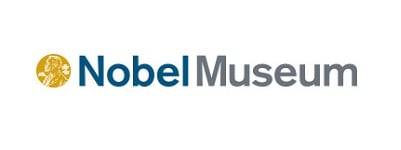
The courage, creativity and persistence of the Nobel Laureates inspires and gives us hope for the future. Based on the Nobel Prize’s unique combination of fields – natural sciences, literature and peace – the Nobel Center c/o organizes exhibitions, school programmes, lectures and dialogues about the great issues of our time.
Over the past 20 years, the Nobel Center c/o’s travelling exhibitions have toured all over the world. The center have worked together with teachers and met thousands of curious school children. With the exhibitions, international meetings, digital channels and activities in Stockholm and Oslo, the center aims to create encounters between people – people who dare to challenge the status quo, who want to ask new questions and think new thoughts, who want to contribute to a better world.
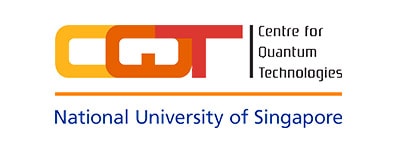
The Centre for Quantum Technologies (CQT) is a National Research Centre of Excellence in Singapore. It brings together physicists, computer scientists and engineers to carry out basic research on quantum physics and to build devices based on quantum phenomena. Experts in this new discipline of quantum technologies are applying their discoveries in the fields of computing, communications and sensing.
CQT was established in December 2007 with support from Singapore’s National Research Foundation and Ministry of Education. It is hosted by the National University of Singapore and also has staff based at Nanyang Technological University and Singapore University of Technology and Design.
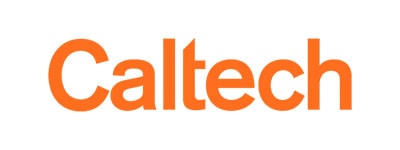
Caltech is a world-renowned science and engineering Institute that marshals some of the world's brightest minds and most innovative tools to address fundamental scientific questions and pressing societal challenges. Caltech's extraordinary faculty and students are expanding our understanding of the universe and inventing the technologies of the future, with research interests from quantum science and engineering to bioinformatics and the nature of life itself, from human behavior and economics to energy and sustainability.
Caltech is small but prizes excellence and ambition. The contributions of Caltech's faculty and alumni have earned national and international recognition, including 38 Nobel Prizes. The Institute manages the Jet Propulsion Laboratory (JPL) for NASA, sending probes to explore the planets of our solar system and quantify changes on our home planet; owns and operates large-scale research facilities such as the Seismological Laboratory and a global network of astronomical observatories, including the Palomar and W. M. Keck Observatories; and cofounded and comanages LIGO, which, in 2016, observed gravitational waves for the first time.

